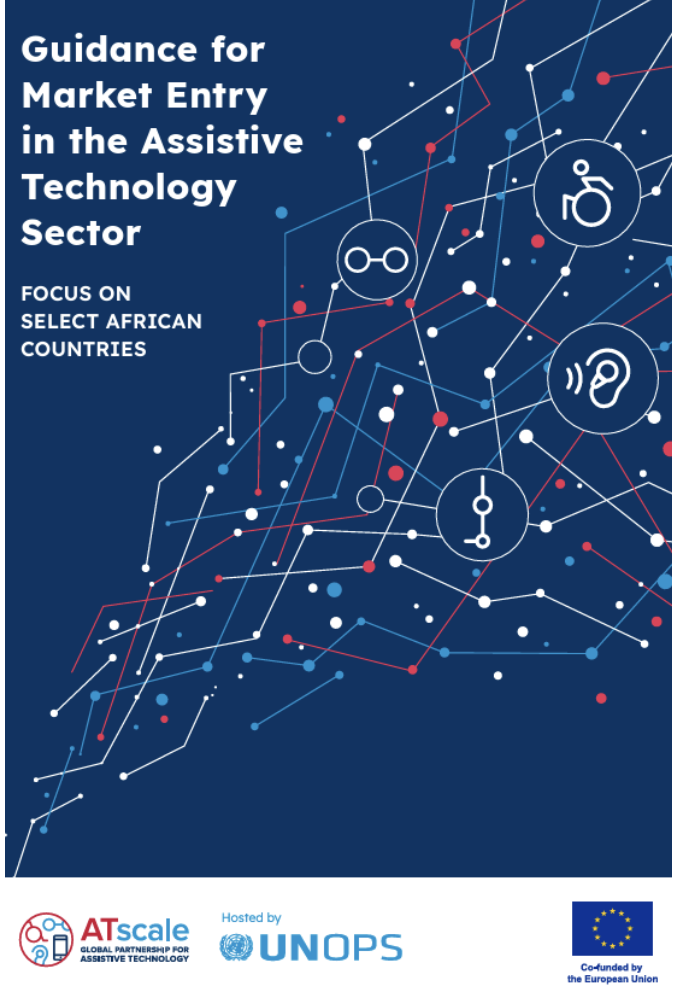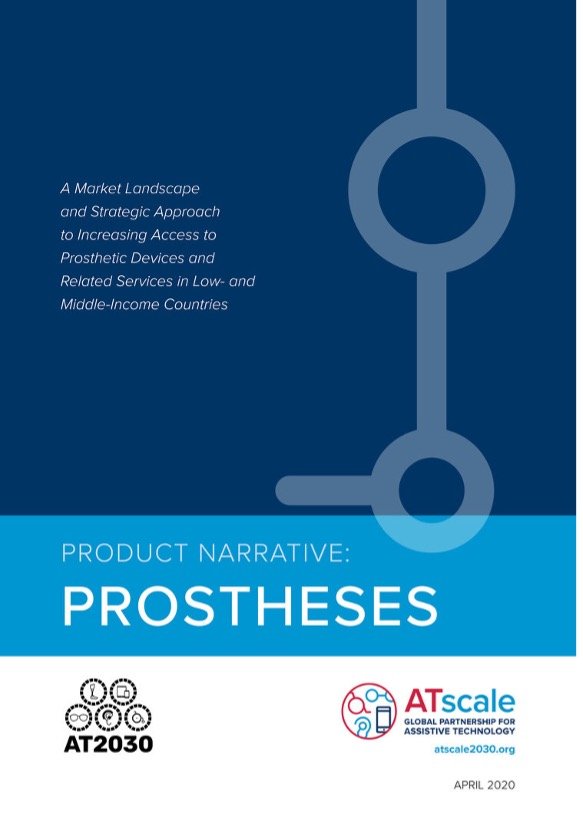Building sustainable AT product markets
ATscale is working towards a step-change in AT markets with growing numbers of buyers and suppliers of affordable and high-quality products closer to users.
Transparent, reliable and up-to-date market data and information are foundations of a well-functioning market and affordability. They allow buyers to better understand the price, quality and availability of products and provide suppliers with a much clearer understanding of market demand. Progress has been made on price transparency, including through Product Narratives and the recently published Market Report.
Ongoing interventions
Domain: Enabling Ecosystem
Timeframe: 2024 - ongoing
Implementing partner: Organisation Africaine pour le Développement des Centres pour Personnes Handicapées (OADCPH)
Strengthen regional AT distribution hub in West Africa
The Organisation Africaine pour le Développement des Centres pour Personnes Handicapées (OADCPH), based in Lomé, Togo, plays a critical role in procuring and supplying assistive products across several countries in West Africa.
ATscale has supported the development of a five-year strategy for the scale-up of this regional role. This strategy will serve as a foundation for further investment in regional AT market-building efforts, aligning with ATscale’s broader objective of scaling up regional AT distribution hubs in Africa.
Domain: Enabling Ecosystem
Timeframe: 2024 - ongoing
Implementing partner: Fundação Faculdade de Medicina
Drive reduction of AT tariffs and taxes in LMICs
Launched in 2024 in partnership with Fundação Faculdade de Medicina, São Paulo, Brazil, this study will focus on analysing the current situation in Africa, identifying key drivers, conducting in-depth studies of specific countries, and laying the groundwork for advocating meaningful change. The study is expected to be completed by mid-2025 and will result in the first comprehensive report on this critical issue.
Domain: Mobility
Timeframe: 2024 - ongoing
Implementing partner: Motivation Charitable Trust
Enhancing availability of locally produced wheelchairs in the common market for Eastern and Southern African countries
To manufacture and assemble appropriate wheelchairs in Kenya (Made AT Kenya) for the common market for Eastern and Southern African countries (Democratic Republic of Congo, Egypt, Ethiopia, Rwanda, Zimbabwe) and Tanzania. The project will test and share learning around the technical and economic viability and sustainability of a national production model.
Completed interventions
Domain: Enabling Ecosystem
Timeframe: 2024
Implementing partner: Altai Consulting
Address market entry challenges in Africa to increase supply of AT
This study aims to develop market entry guidance for key African markets and develop recommendations to reduce structural barriers. ATscale has contracted Altai Consulting, an organization experienced in this area, for this study. Four countries have been prioritized: Nigeria, Kenya, Egypt and South Africa. The study leverages desk research, data analysis and key stakeholder interviews. It is currently in its final phase and is expected to be concluded and published in the first semester of 2025.
Domain: Enabling Ecosystem
Timeframe: 2023
Implementing partner: Clinton Health Access Initiative (CHAI)
Market intelligence and visibility Phase 2: Global AT Market Report to increase availability of AT in LMICs
The Assistive Products Market Report 2025 provides an in-depth analysis of the demand landscape and supply chain costs within the assistive products sector.
The first Assistive Products Market Report, focusing on the supply side, was launched in June 2024 in collaboration with the Clinton Health Access Initiative. A second report, which focuses on the demand side of the assistive products market, is expected to be released soon.
Read the assistive products market report. Accessible and translated versions available and 3 explainer videos released to accompany the report launch
Domain: Enabling Ecosystem
Timeframe: 2022
Implementing partner: Clinton Health Access Initiative (CHAI)
Improve market intelligence and visibility in AT markets - Phase 1 (scoping)
The cost of quality products and services is one of the major barriers to accessing lifesaving assistive technology in LMICs. Lower-cost suppliers exist, but those responsible for procurement often have little visibility of who they are, what they offer and of what quality. Suppliers, on the other hand, lack understanding of the demand, which prevents them from entering LMIC markets. In many global health markets, market intelligence interventions are supporting better functioning markets, e.g. for products to treat or prevent HIV and malaria. Better market intelligence and visibility is needed in the AT sector to support access to appropriate assistive products at more affordable prices.
This project was built on the Product Narratives and has mapped and prioritized market intelligence gaps in the AT sector – focussing on wheelchairs, prostheses, hearing aids and eyeglasses - and identified the most appropriate market intelligence interventions to benefit the AT sector. Recommendations suggested where and how ATscale can potentially engage and add value.
Domain: Digital
Timeframe: 2020
Implementing partner: Clinton Health Access Initiative (CHAI) under the AT2030 programme, funded by UK aid
Product Narrative: Digital Assistive Technology
The product narrative illuminates many barriers to achieving access to affordable, high-quality, and appropriate digital assistive technology in low- and middle-income countries. ATscale complemented its cross-cutting activities targeted at developing an enabling ecosystem with in-depth analysis to identify key barriers and promising market interventions across the value-chain, stretching from research and development to production and procurement, all the way through to supporting service delivery at the user and healthcare worker levels.
Read the Product NarrativeDigital Assistive Technology. Accessible and translated versions available
Domain: Hearing
Timeframe: 2019
Implementing partner: Clinton Health Access Initiative (CHAI) under the AT2030 programme, funded by UK aid
Product Narrative: Hearing Aids and Related Services
The product narrative illuminates many barriers to achieving access to affordable, high-quality, and appropriate hearing aids and related services in low- and middle-income countries. ATscale complemented its cross-cutting activities targeted at developing an enabling ecosystem with in-depth analysis to identify key barriers and promising market interventions across the value-chain, stretching from research and development to production and procurement, all the way through to supporting service delivery at the user and healthcare worker levels.
Read the Hearing Aids and Related Services. Accessible and translated versions available
Domain: Mobility
Timeframe: 2019
Implementing partner: Clinton Health Access Initiative (CHAI) under the AT2030 programme, funded by UK aid
Product Narrative: Wheelchairs
The product narrative illuminates many barriers to achieving access to affordable, high-quality, and appropriate wheelchairs and related services in low- and middle-income countries. ATscale complemented its cross-cutting activities targeted at developing an enabling ecosystem with in-depth analysis to identify key barriers and promising market interventions across the value-chain, stretching from research and development to production and procurement, all the way through to supporting service delivery at the user and healthcare worker levels.
Read the Product Narrative Wheelchairs. Accessible and translated versions available
Domain: Mobility
Timeframe: 2020
Implementing partner: Clinton Health Access Initiative (CHAI) under the AT2030 programme, funded by UK aid
Product Narrative: Prostheses and Related Services
The product narrative illuminates many barriers to achieving access to affordable, high-quality, and appropriate prostheses and related services in low- and middle-income countries. ATscale complemented its cross-cutting activities targeted at developing an enabling ecosystem with in-depth analysis to identify key barriers and promising market interventions across the value-chain, stretching from research and development to production and procurement, all the way through to supporting service delivery at the user and healthcare worker levels.
Read the Product Narrative Prostheses and Related Services. Accessible and translated versions available
Domain: Vision
Timeframe: 2019
Implementing partner: Clinton Health Access Initiative (CHAI) under the AT2030 programme, funded by UK aid
Product Narrative: Eyeglasses
The product narrative illuminates many barriers to achieving access to affordable, high-quality, and appropriate eyeglasses in low- and middle-income countries. ATscale complemented its cross-cutting activities targeted at developing an enabling ecosystem with in-depth analysis to identify key barriers and promising market interventions across the value-chain, stretching from research and development to production and procurement, all the way through to supporting service delivery at the user and healthcare worker levels.
Read the Product Narrative Eyeglasses. Accessible and translated versions available
Domain: Mobility
Timeframe: 2022
Market access deal - Prosthetics Device Landscape
An estimated 65 million people live with limb amputations globally and most amputees need prosthetic care, yet the World Health Organization (WHO) estimates that less than 15% have access in low-and middle- income countries. Affordable, quality prosthetic components are critical for achieving optimal health outcomes. When conducting a sector analysis in 2019 on behalf of AT2030 and ATscale, CHAI found that informed purchasing of prosthetic components is complicated by three factors:
poor visibility on the existing suppliers;
opaque quality markings, poor quality control and limited education among workforce on quality; and
no standardized approach and limited clinical field testing.






